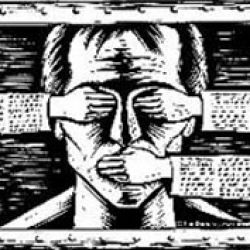Belarusian economy is going through difficult times: it is almost impossible to buy foreign currency, long queues emerge near exchange offices, and the prices of some consumer goods have risen almost by half. But people continue to snap up sugar, butter, cereals as well as household appliances and gold in order to spend Belarusian roubles which become more and more worthless with each passing day.
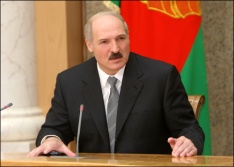 President Aliaksandr Lukashenka, left, decided that the ones to blame for this situation are “the foreign mass-media” – especially Russian ones, which are still very popular in Belarus. For instance, on 27 May, at a meeting on the current situation in the consumer and foreign currency market, Lukashenka demanded a shut-down of Russian media in Belarus as they “stir up the situation.”
President Aliaksandr Lukashenka, left, decided that the ones to blame for this situation are “the foreign mass-media” – especially Russian ones, which are still very popular in Belarus. For instance, on 27 May, at a meeting on the current situation in the consumer and foreign currency market, Lukashenka demanded a shut-down of Russian media in Belarus as they “stir up the situation.”
“The greatest hysteria is found in Russian mass media. Our media take the second place, those published here. I won’t name any names to avoid giving them publicity, but the government must do everything it can to ensure they are no longer present in our country,” – said Lukashenka.
Lawyer of the Belarusian Association 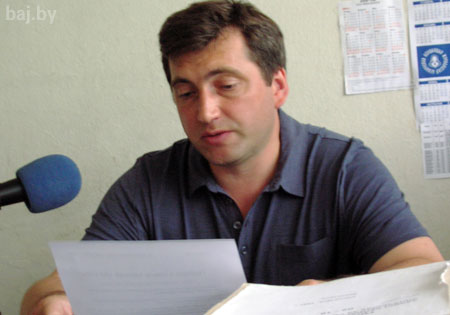 of Journalists (BAJ) Andrei Bastunets, right, said that “one can list a dozen articles of the Constitution, which are basically crossed out by these words of the head of state.”
of Journalists (BAJ) Andrei Bastunets, right, said that “one can list a dozen articles of the Constitution, which are basically crossed out by these words of the head of state.”
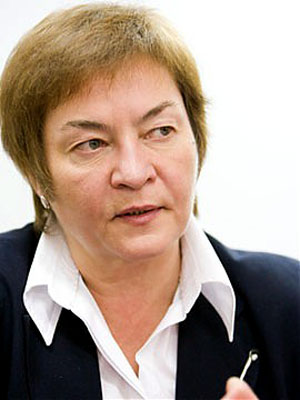 The head of BAJ Zhanna Litvina, left, commented on the situation: “The mood of the people is out of control. The demand to shut down the media is a sign that, despite all its activity and aggressiveness, the official propaganda machine does not work. Therefore, the authorities are trying in an absolutely uncivilized way to remove those who create “competition” to the propaganda. This is the kind of response to the society’s demand of information without censorship. People want to know what’s really going on.”
The head of BAJ Zhanna Litvina, left, commented on the situation: “The mood of the people is out of control. The demand to shut down the media is a sign that, despite all its activity and aggressiveness, the official propaganda machine does not work. Therefore, the authorities are trying in an absolutely uncivilized way to remove those who create “competition” to the propaganda. This is the kind of response to the society’s demand of information without censorship. People want to know what’s really going on.”
Deportation Nevertheless, the first Russian journalist was expelled from Belarus on 30 May. Rodion Marinichev, right, a correspondent of Russian television channel “Dozhd” (“Rain”), was detained in Minsk after interviewing fellow journalist Iryna Khalip, the wife of former presidential candidate, now a political prisoner Andrei Sannikau.
Nevertheless, the first Russian journalist was expelled from Belarus on 30 May. Rodion Marinichev, right, a correspondent of Russian television channel “Dozhd” (“Rain”), was detained in Minsk after interviewing fellow journalist Iryna Khalip, the wife of former presidential candidate, now a political prisoner Andrei Sannikau.
Marinichev was stopped in the street by policemen, who checked his documents and the content of his bags. After checking his passport, they saw a certificate of employment at “Dozhd” channel and asked for accreditation. The explanation of working “privately” did not satisfy the police, and they brought Marinichev to the police station.
The journalist was released after 3 hours, but only after the police took a memory card with all the videos. Now Marinichev is expelled, and banned from Belarus for 5 years.
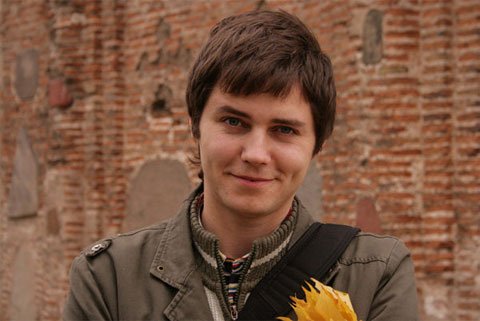 Accused of pornography
Accused of pornography
Meanwhile, Belarusian authorities also pay attention to Belarusian journalists. For example, journalist Aliaksei Salei, left, of the magazine «Magazyn Polski na uchodzstwie», has been placed on a ‘wanted list’ by the police.
On 16 May, the site of the Hrodna regional police department published the following information: “Alexei Salei is wanted by the Department of Interior Affairs of the Leninsky district of Hrodna, as he is accused of committing a crime under paragraph 2 of Article 343 of the Criminal Code of Belarus “Production and distribution of pornographic material or objects of pornographic nature with images of minors.”
19 December 2010 Salei participated in the Ploshcha, where he carried out his professional duties, together with another Hrodna journalist Andrzej Poczobut. After that, Salei was summoned to the KGB in regard to his presence on Ploshcha, and later police conducted a search at his home.
Salei’s mother believes that the criminal case initiated against her son is a political reprisal: “My son was persecuted primarily because he refused to testify against Poczobut. When he was summoned to the KGB, he returned home and told me that he was asked to slander Poczobut, but he refused. He was threatened that he will regret this decision. Then, when the police came to me, they also said this: “Watch that he will be in a worse situation, let him come to us and tell everything like he should.”
 In a more recent example, a criminal case was launched on 18 March against the well-known Hrodna journalist Andrzej Poczobut himself, right, “for insulting the president of Belarus”. According to the Prosecutor’s Office, Poczobut insulted Lukashenka on the pages of the Polish “Gazeta Wyborcza”, the news-site “Bielaruski Partyzan” (“The Belarusian Partisan”), and his own blog poczobut.livejournal.com during 2010-2011.
In a more recent example, a criminal case was launched on 18 March against the well-known Hrodna journalist Andrzej Poczobut himself, right, “for insulting the president of Belarus”. According to the Prosecutor’s Office, Poczobut insulted Lukashenka on the pages of the Polish “Gazeta Wyborcza”, the news-site “Bielaruski Partyzan” (“The Belarusian Partisan”), and his own blog poczobut.livejournal.com during 2010-2011.
 Standing up for colleagues
Standing up for colleagues
Head of the “Reporters Without Borders” bureau for Europe and ex-USSR countries Johann Bihr spoke about violations of the freedom of speech in Belarus. “We see that the use of political repressions against journalists in Belarus is getting more and more widespread. Court proceedings are held without any grounds, journalists are imprisoned and fined,” stated Bihr. He added that “Reporters Without Borders” is very concerned about the situation and ensured that all cases of violations of freedom of speech in Belarus are recorded.
 The freedom of speech situation in Belarus was discussed at the meeting of the executive committee of the Association of European Journalists, which adopted a specific statement.
The freedom of speech situation in Belarus was discussed at the meeting of the executive committee of the Association of European Journalists, which adopted a specific statement.
“The AEJ calls on the President and government of Belarus to annul the various jail sentences, suspended sentences and prosecutions against Dzmitry Bandarenka, Aliaksandr Feduta, Iryna Khalip, Natallia Radzina, Pavel Seviarynets and Sergey Vozniak” said the statement, that was signed by the Secretary-General of the Association of European Journalists, Peter Kramer, and Media Freedom Representative William Horsley. The European organization also condemned the criminal charges against Poczobut, who is a member of BAJ.
The International Observation Mission of the Committee for International Control over the human rights situation in Belarus has also developed and distributed a statement, “Obstacles to the activities of foreign media in Belarus”, which expressed deep concern over the practice that in recent months has demonstrated the negative effects of Belarusian law “On Mass Media” in terms of regulating the professional activities of foreign media. The statement of international observation missions demands:
-to bring the law “On Mass Media” in line with the recommendations of the OSCE Representative on Freedom of the Media published in 2008;
-to end the practice of expulsion and unjustified withdrawal of accreditation from foreign journalists;
-for the authorities of the Republic of Belarus to fulfil their international obligations in the sphere of media freedom, which particularly concern assistance in entry and accreditation of foreign journalists;
-to guarantee prevention of similar cases of pressure on journalists in the future from the side of the authorities of the Republic of Belarus.
Related articles
Belarus: protesters tried, journalists beaten, rights defenders expelled


